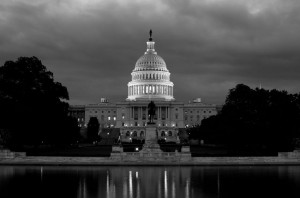Congress, Graded by Their Values
 Photo by orhancam / 123RF
Photo by orhancam / 123RF The recent congressional scorecard released by the Center for Freethought Equality, the advocacy and political arm of the American Humanist Association, identifies our allies in the US Congress who support issues important to the secular community and demonstrates the partisan polarity in our current political environment.
The nineteen legislators with the highest ranking of “A+” deserve special recognition for their unyielding support for church/state separation, LGBTQ equality, and reproductive rights: Matthew Cartwright (PA-17), Judy Chu (CA-27), Mark DeSaulnier (CA-11), Steve Cohen (TN-9), Alan Grayson (FL-9), Eleanor Holmes Norton (DC), Mike Honda (CA-17), Derek Kilmer (WA-3), Ted Lieu (CA-33), Zoe Lofgren (CA-19), Alex Lowenthal (CA-27), Carolyn Maloney (NY-12), Mark Pocan (WI-2), Charles Rangel (NY-13), Jan Schakowsky (IL-9), Adam Schiff (CA-28), Louise Slaughter (NY-25), Adam Smith (WA-9), and Jackie Speier (CA-14).
All of these members of Congress are Democrats.
The Center for Freethought Equality ranked representatives based on their votes on legislation dealing with the following: exemptions for federal contractors from anti-LGBTQ discrimination policies; vouchers for private, religious schools; exemptions for religious employers who wish to discriminate against employees who use birth control; exemptions for individuals who wish to discriminate against LGBTQ Americans because of their views on marriage equality; and religious hospitals, insurance providers, and other healthcare professionals who wish to discriminate against women seeking abortion or contraceptives. The scorecard also gave bonus points to members who sponsored or co-sponsored the Darwin Day and National Day of Reason Resolutions, which promote scientific integrity and reason as American values.
The aggregate scores based on these votes demonstrate whether legislators are seeking to bolster or weaken our secular government and civil rights.
The scorecard results fell along party lines. Of all House members, 152 received the highest ratings of A or A+. All of these legislators are Democrats. Thirty-one members of the House earned B’s and two were given C’s. Again, all of these legislators are Democrats. Only in the failing grades do we see a few Democrats mixed in with the entire Republican membership of the House: two Democrats and seven Republicans earned D’s, while two Democrats and 240 Republicans earned F’s. The Congressional Democrats fell into all of the rating categories, but fortunately were heavily skewed to the top rankings.
Conversely, the Republican near uniform failing ratings demonstrate the homogeneity of their voting on these issues and the almost complete control that the conservative religious base of the Republican Party has on their representatives in Congress.
With the Republican Party as the majority party in the House—and the largest Republican majority in the House in eighty-five years—this control and uniformity is daunting. However, as the nonreligious community continues to grow, future scorecards should show a corresponding positive shift in rankings that support secular government and civil rights for all Americans.
To make this happen, the nonreligious community must become more politically engaged and hold their legislators accountable.
According to the Pew Research Center, the religiously unaffiliated are now the largest religious group in America, surpassing Evangelical Protestants and Catholics. With nearly a quarter of Americans not identifying with any religion, our community has the numbers to be powerful constituency. Even if you just consider Americans who identify as atheists and agnostics, this community is as large as the Jewish, Muslim, Mormon, Orthodox Christian, Buddhist, Jehovah’s Witness, and Hindu communities combined.
